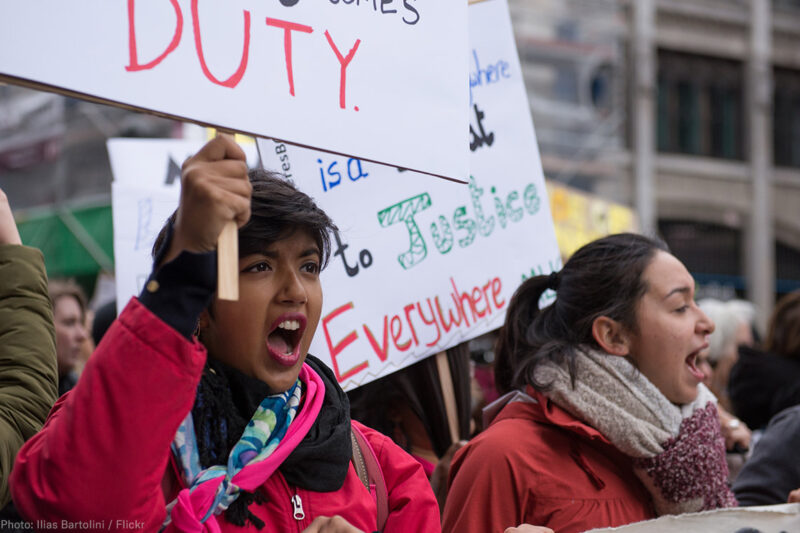
On Jan. 21, 2017, the day after Trump took office, women throughout the country (and indeed the world) took part in the largest protest march in U.S. history. They protested the election of a man who had demonstrated his disdain for women throughout the campaign and demanded policy change on numerous fronts necessary to ensure gender justice.
That march embraced a diverse movement focused on issues of concern to a broad range of women, people of varied gender identities and sexualities, people with disabilities, poor women struggling to raise their families with dignity, women impacted by the criminal justice system, immigrants seeking a better life, and millions more who face myriad forms of oppression based on their intersecting identities.
The ACLU has been fighting gender discrimination since its founding. Under the leadership of Ruth Bader Ginsburg in the 1970s, the Women’s Rights Project was instrumental in knocking down the vast majority of laws that explicitly treated women differently from men and in establishing constitutional protections against discrimination on the basis of sex.
But as is evident by what we see today, gender discrimination persists. Last fall, we saw the explosion of the #MeToo Movement. On a daily basis, women began sharing their stories of sexual harassment and assault and insisting on systemic change to end the era of impunity. Transgender people continue to be subject to rampant discrimination, and women’s wages, particularly for women of color, still fall well below men’s.
The ACLU is committed to eradicating gender discrimination in all its forms. For the next year, we commit to filing a lawsuit or taking other action each month to address an ongoing form of gender injustice. Our 12 Months, 12 Faces of Gender Discrimination Initiative will highlight an area of discrimination and the steps we are taking to eradicate it. With each effort, we pledge to achieve a victory or make progress toward one of the 12 goals set forth in the new ACLU Vision for Achieving Gender Justice.
This month, we filed Grace v. Sessions, a case challenging Attorney General Jeff Sessions’ new policies making it more difficult for victims of domestic violence and gang brutality to seek asylum in the U.S. For decades, the U.S. has recognized that individuals could state a credible fear of persecution based on these grounds. With the new policies, the Trump administration threatens to undo a long line of precedent and jeopardize the safety and lives of some of the world’s most vulnerable people. This case lies at the intersection of gender justice and immigrants’ rights, making clear that due to our multiple intersecting identities, many of us suffer from overlapping forms of discrimination.
In the coming months, we will highlight work to address digital discrimination and the difficulties faced by incarcerated mothers. We will showcase the persistence of pregnancy discrimination 40 years after the passage of the Pregnancy Discrimination Act. And we will shine a light on the low numbers of women in leadership positions in organizations, corporations, legislatures, and governors’ mansions – and some striking successes of women running for office in record numbers, particularly women of color.
So watch this space for updates on our progress.

